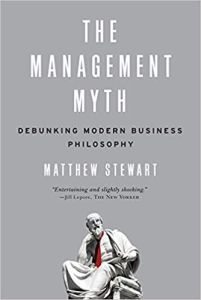Join getAbstract to access the summary!

Join getAbstract to access the summary!
Matthew Stewart
The Management Myth
Debunking Modern Business Philosophy
W.W. Norton, 2009
What's inside?
A fascinating, funny insider’s take on phony management consultants and business gurus.
Recommendation
Each year, a thousand or so new business books join the tens of thousands already published. In many, the authors – often, “business gurus” or consultants – sell their advice with a level of certainty approaching fact. Former consultant Matthew Stewart takes a different view: He demolishes the notion of management as science. From Frederick Winslow Taylor’s stopwatches and measuring tapes to Tom Peters’s “eight fundamental principles” for excellence, Stewart exposes the flawed research and outright deceptive traits of popular management gurus and consulting firms. Stewart emphasizes the negative over the positive, and has a lot of fun weaving in his own hilarious and sometimes tragic years as a strategy consultant. While management consulting – like most fields – has both genuine experts and brazen charlatans, anyone considering hiring a consultant, becoming one or implementing the latest, greatest business idea should read this first.
Summary
About the Author
Matthew Stewart, PhD, studied philosophy at Princeton and Oxford universities, and writes for The Atlantic and other publications.

















Comment on this summary